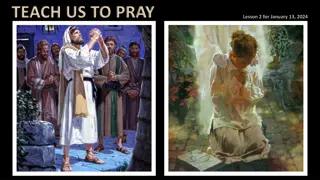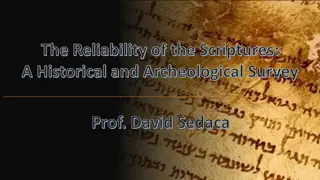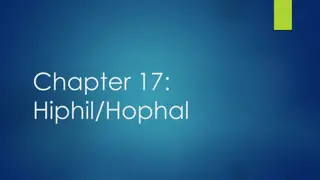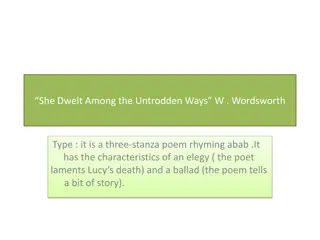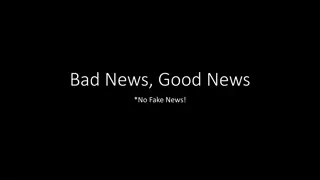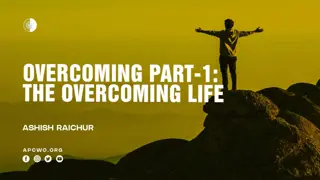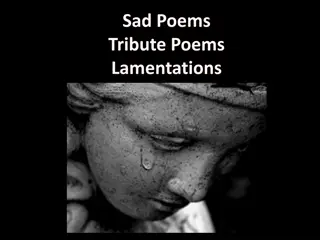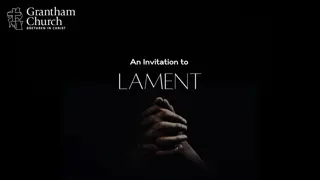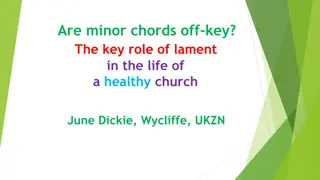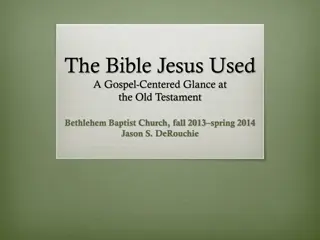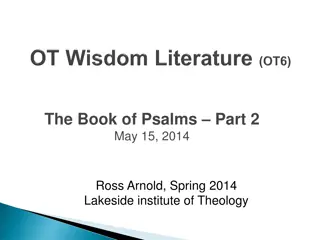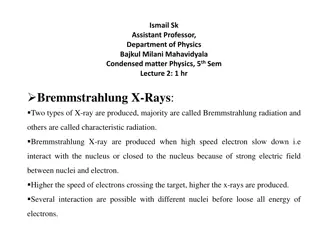Lessons in Lament from the Scriptures
Explore the powerful moments of lament in the Bible from Exodus to the Psalms, reflecting on the cries, doubts, and trust expressed by figures like the Israelites, Jesus, and the Psalmist. Discover the necessity of lament in developing a resilient faith.
Download Presentation

Please find below an Image/Link to download the presentation.
The content on the website is provided AS IS for your information and personal use only. It may not be sold, licensed, or shared on other websites without obtaining consent from the author.If you encounter any issues during the download, it is possible that the publisher has removed the file from their server.
You are allowed to download the files provided on this website for personal or commercial use, subject to the condition that they are used lawfully. All files are the property of their respective owners.
The content on the website is provided AS IS for your information and personal use only. It may not be sold, licensed, or shared on other websites without obtaining consent from the author.
E N D
Presentation Transcript
Exodus 14:10-12 NIV 10As Pharaoh approached, the Israelites looked up, and there were the Egyptians, marching after them. They were terrified and cried out to the Lord.11They said to Moses, Was it because there were no graves in Egypt that you brought us to the desert to die? What have you done to us by bringing us out of Egypt?12Didn t we say to you in Egypt, Leave us alone; let us serve the Egyptians ? It would have been better for us to serve the Egyptians than to die in the desert!
Paul, Philippians 2:12-14 NIV 12Therefore, my dear friends, as you have always obeyed not only in my presence, but now much more in my absence continue to work out your salvation with fear and trembling,13for it is God who works in you to will and to act in order to fulfill his good purpose. 14Do everything without grumbling or arguing,15so that you may become blameless and pure, children of God without fault in a warped and crooked generation.
My God, my God, why have you abandoned me? Why are you so far away when I groan for help? Psalm 22:1 NLT Jesus lament from the cross Matt 27:46; Mark 15:34
Psalm 13:1-2 NIV 1 How long, Lord? Will you forget me forever? How long will you hide your face from me? 2How long must I wrestle with my thoughts and day after day have sorrow in my heart? How long will my enemy triumph over me?
Psalm 13:3-4 NIV 3Look on me and answer, Lord my God. Give light to my eyes, or I will sleep in death, 4and my enemy will say, I have overcome him, and my foes will rejoice when I fall.
Psalm 13:5-6 NIV 5But I trust in your unfailing love; my heart rejoices in your salvation. 6I will sing the Lord s praise, for he has been good to me.
We need to practice lament if were going to develop a resilient faith. Why? The Necessity of Lament
We need to practice lament if were going to develop a resilient faith. Why? 1. Lament says, This isn t right. The Necessity of Lament
We need to practice lament if were going to develop a resilient faith. Why? 1. Lament says, This isn t right. 2. Lament says, This hurts, but I m not quitting. The Necessity of Lament
We need to practice lament if were going to develop a resilient faith. Why? 1. Lament says, This isn t right. 2. Lament says, This hurts, but I m not quitting. 3. Lament says, God, I/we need your help. The Necessity of Lament
Hebrews 2:14-15 NLT 14Because God s children are human beings made of flesh and blood the Son also became flesh and blood. For only as a human being could he die, and only by dying could he break the power of the devil, who had the power of death. 15Only in this way could he set free all who have lived their lives as slaves to the fear of dying.
Hebrews 2:17-18 NLT 17Therefore, it was necessary for him to be made in every respect like us, his brothers and sisters,so that he could be our merciful and faithful High Priest before God. Then he could offer a sacrifice that would take away the sins of the people.18Since he himself has gone through suffering and testing, he is able to help us when we are being tested.


